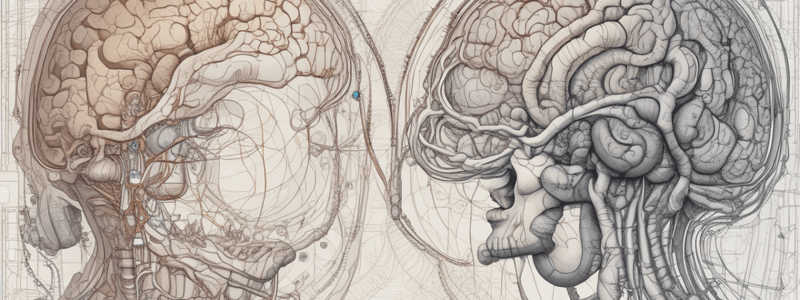Podcast
Questions and Answers
What triggers the activation of a sensory neuron in a muscle spindle?
What triggers the activation of a sensory neuron in a muscle spindle?
- Muscle stretch (correct)
- Muscle fatigue
- Muscle relaxation
- Muscle contraction
What is the purpose of the stretch reflex?
What is the purpose of the stretch reflex?
- To increase muscle fatigue
- To prevent overstretching and potential tearing of the tendons and muscle (correct)
- To aid in muscle contraction
- To enhance muscle relaxation
Where are the dendritic endings of sensory neurons found?
Where are the dendritic endings of sensory neurons found?
- Within the CNS
- Within the motor neuron
- Within the muscle spindles (correct)
- Within the muscle fibers
What type of reflex is the patellar reflex?
What type of reflex is the patellar reflex?
What is the function of the motor neuron in the stretch reflex?
What is the function of the motor neuron in the stretch reflex?
What is the location of the integration of innate reflexes?
What is the location of the integration of innate reflexes?
What is the response of the muscle fibers in the stretch reflex?
What is the response of the muscle fibers in the stretch reflex?
What is the relation between the sensory neuron and the motor neuron?
What is the relation between the sensory neuron and the motor neuron?
What is an example of a stretch reflex?
What is an example of a stretch reflex?
What is a reflex?
What is a reflex?
Where are spinal reflexes processed?
Where are spinal reflexes processed?
What is the simplest type of reflex?
What is the simplest type of reflex?
What type of muscle is controlled by the autonomic nervous system?
What type of muscle is controlled by the autonomic nervous system?
What is the function of sensory cell clusters called spindles in skeletal muscles?
What is the function of sensory cell clusters called spindles in skeletal muscles?
What is the primary function of reflexes?
What is the primary function of reflexes?
What is the difference between somatic and autonomic reflexes?
What is the difference between somatic and autonomic reflexes?
In a reflex arc, what is the direction of muscle activation relative to the stimulus?
In a reflex arc, what is the direction of muscle activation relative to the stimulus?
The brain is involved in the reflex arc of spinal reflexes.
The brain is involved in the reflex arc of spinal reflexes.
Monosynaptic reflexes involve multiple synapses within the spinal cord.
Monosynaptic reflexes involve multiple synapses within the spinal cord.
Somatic reflexes are controlled by the autonomic nervous system.
Somatic reflexes are controlled by the autonomic nervous system.
Smooth muscle is controlled by the somatic nervous system.
Smooth muscle is controlled by the somatic nervous system.
Reflexes can be categorized as either somatic or autonomic.
Reflexes can be categorized as either somatic or autonomic.
Muscle activation in a reflex can occur on the same side of the body as the stimulus only.
Muscle activation in a reflex can occur on the same side of the body as the stimulus only.
Voluntary muscles can be flexed with input from the brain only.
Voluntary muscles can be flexed with input from the brain only.
Sensory cell clusters referred to as spindles are present in smooth muscles.
Sensory cell clusters referred to as spindles are present in smooth muscles.
Muscle spindles are responsible for detecting muscle contraction.
Muscle spindles are responsible for detecting muscle contraction.
The patellar reflex is an example of a learned reflex.
The patellar reflex is an example of a learned reflex.
The motor neuron fires directly to the brain in the stretch reflex.
The motor neuron fires directly to the brain in the stretch reflex.
The patellar reflex is a response to muscle contraction.
The patellar reflex is a response to muscle contraction.
Sensory neurons synapse directly with motor neurons in the CNS.
Sensory neurons synapse directly with motor neurons in the CNS.
Innate reflexes are always voluntary responses.
Innate reflexes are always voluntary responses.
Muscle spindles are responsible for muscle contraction.
Muscle spindles are responsible for muscle contraction.
The stretch reflex is a response to muscle shortening.
The stretch reflex is a response to muscle shortening.
The dendritic endings of sensory neurons are found outside the muscle spindles.
The dendritic endings of sensory neurons are found outside the muscle spindles.
Flashcards are hidden until you start studying
Study Notes
Reflexes
- A reflex is a rapid, automatic motor response to a stimulus, occurring over a specific neural pathway called a reflex arc.
- Reflexes prevent damage to tissues by activating a muscle to respond to a stimulus.
- Some reflexes are processed in the brain, while others are processed in the spinal cord, known as spinal reflexes.
Reflex Arc
- A reflex arc involves a sensory neuron, the spinal cord, and a motor neuron.
- The simplest type of reflex is monosynaptic, involving only a single synapse within the spinal cord.
- The sensory neuron directly synapses with a motor neuron in the spinal cord, activating the correct muscle effector.
Types of Reflexes
- Reflexes can be categorized as either somatic or autonomic, depending on whether they are controlled by the somatic or autonomic nervous system.
- Somatic reflexes involve skeletal muscle and are controlled by the somatic nervous system.
- Autonomic reflexes involve smooth muscle and are controlled by the autonomic nervous system.
Somatic Reflexes
- Muscle spindles, present in skeletal muscles, are sensitive to muscle stretch.
- When a muscle stretches, the spindle stretches, and the dendritic endings of sensory neurons detect the stretch, causing activation of a sensory neuron.
- The sensory neuron fires, synapses directly with a motor neuron, and stimulates the muscle fibers to contract, opposing the potentially damaging stretch.
Patellar Knee Jerk Reflex
- The patellar reflex is an example of a stretch reflex, preventing overstretching and potential tearing of tendons and muscle.
- It is an innate reflex, built-in and involuntary, often integrated in the spinal cord, and bypassing the brain completely.
- The patellar reflex is a type of somatic reflex, involving skeletal muscle and controlled by the somatic nervous system.
Reflexes
- A reflex is a rapid, automatic motor response to a stimulus, occurring over a specific neural pathway called a reflex arc.
- Reflexes prevent damage to tissues by activating a muscle to respond to a stimulus.
- Some reflexes are processed in the brain, while others are processed in the spinal cord, known as spinal reflexes.
Reflex Arc
- A reflex arc involves a sensory neuron, the spinal cord, and a motor neuron.
- The simplest type of reflex is monosynaptic, involving only a single synapse within the spinal cord.
- The sensory neuron directly synapses with a motor neuron in the spinal cord, activating the correct muscle effector.
Types of Reflexes
- Reflexes can be categorized as either somatic or autonomic, depending on whether they are controlled by the somatic or autonomic nervous system.
- Somatic reflexes involve skeletal muscle and are controlled by the somatic nervous system.
- Autonomic reflexes involve smooth muscle and are controlled by the autonomic nervous system.
Somatic Reflexes
- Muscle spindles, present in skeletal muscles, are sensitive to muscle stretch.
- When a muscle stretches, the spindle stretches, and the dendritic endings of sensory neurons detect the stretch, causing activation of a sensory neuron.
- The sensory neuron fires, synapses directly with a motor neuron, and stimulates the muscle fibers to contract, opposing the potentially damaging stretch.
Patellar Knee Jerk Reflex
- The patellar reflex is an example of a stretch reflex, preventing overstretching and potential tearing of tendons and muscle.
- It is an innate reflex, built-in and involuntary, often integrated in the spinal cord, and bypassing the brain completely.
- The patellar reflex is a type of somatic reflex, involving skeletal muscle and controlled by the somatic nervous system.
Studying That Suits You
Use AI to generate personalized quizzes and flashcards to suit your learning preferences.




